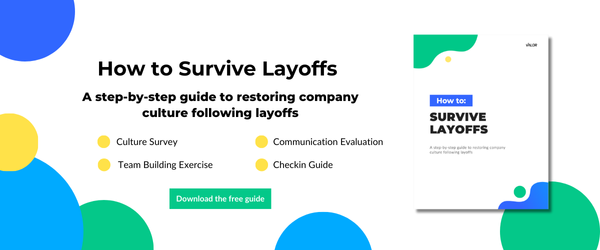- Valor Performance Blog
- Stabilizing Company Culture After Layoffs
Stabilizing Company Culture After Layoffs
Discussions centered around layoffs are never easy. In recent years, downsizing has become an increasingly relevant topic. And if your company is dealing with any form of reorganization, chances are it’s affecting more than just employee headcount. Layoffs pose a risk to a company’s morale, introducing new challenges throughout an organization.
Employees who managed to avoid being laid off, also known as survivors, come out less than unscathed. Studies have shown that these survivors are plagued with concerns regarding their job’s security, the stability of the company, and heightened stress as a result of increased workloads and re-structured teams. This phenomenon is known as Survivor’s Syndrome, and it can directly affect your business. Experts have proven that these uncertainties lead to higher employee turnover, a decrease in employee performance, burnout, and a lack of trust in their organization; drastically affecting the culture and employee morale. So how should employers position themselves in a way that boosts morale, enhances culture, and results in stronger relationships and improved employee performance? Here’s what we know.
Company culture has always been a leading factor in creating a company’s identity. So it’s no surprise that now more than ever a company culture is a direct indicator of a business's well-being. In fact, studies have shown that 88% of employees believe strong company culture is crucial for a business’s success.
So what constitutes a stable organizational culture, one might ask?
Company culture consists of the shared assumptions, generalizations, values, and principles that shape the company’s environment by putting understood social and psychological guidelines into place. Furthermore, an employee in an organization might define a stable culture as one that practices open and honest communication, shared respect amongst employers and employees, and a collaborative team environment. All of these qualities are important, but each company is different and contains its own values and principles.
Take Google for example. Aside from being the most utilized search engine on the planet, Google has also gained notoriety for its unique company culture, which includes being named Comparably’s recipient for Best Company Culture in 2021.
While perks like a casual dress code and a dog-friendly office are one thing, Google’s culture thrives because of its understood values. The trust they build with their employees is a direct result of strong communication, evident transparency, and an understanding of the importance of personal development for professional growth.
But Google didn’t create this culture overnight. Since its start in 1998, Google has been seeking out ways to optimize its culture, and all of these efforts center around its values of encouraging individuality, creativity, and collaboration.
It takes time to build trust between employers and employees, a task that Google and many other companies alike have proven to be invaluable. In addition to directly affecting business, having a stable company culture is also linked to higher rates of productivity, performance, and employee loyalty.
How can layoffs destabilize a corporate culture?
When the values of a company are not clearly defined and effectively communicated, it leaves employees feeling uncertain in times of trouble.
Survivor Syndrome is a widely known consequence of company layoffs. Survivor Syndrome can be defined as the psychological consequence of layoffs, downsizing or reorganization in a workplace. Survivor Syndrome can leave employees feeling a sense of guilt and confusion. It depletes any feeling of security and forces them to question their fate within the company. These symptoms have been known to cause an increase in employee turnover, hindered productivity from overwhelming workloads, burnout, and decreased employee engagement.
Stabilizing the culture
So how does a leader recover from such chaos to return to a stable environment for you and your team?
-
Communicate effectively.
The nature of communication shared with your employees before and after a layoff can be detrimental to your organization’s success. Layoffs must be handled with ultimate care and consideration for everyone involved. Allow your employees to process the news and provide a safe environment to answer questions and address concerns. Effective communication is mandatory in building a foundation of trust. -
Be transparent when possible.
A transparent culture is one that represents collaboration, recognizes and appreciates an employee's successes, and effectively addresses matters at hand. Transparency is built upon open and honest communication between both the employer and employee. Transparency creates ultimate efficiency for both, allowing each party to feel comfortable discussing any issue that might arise. By remaining transparent, you are building a collaborative workspace for your employees, reminding them that you’re a team working towards a common goal. -
Set goals and timelines.
Changes in an organization's structure are often accompanied by a shift in workload and unclear responsibilities. Putting clear goals and timelines in place creates consistency across the board. It also communicates the trust you have in their abilities to perform. Exhibiting confidence in your employee’s abilities will boost motivation and magnify productivity. -
Recommit to company values.
Values create a sense of community and understanding within a workplace. In the circumstance of layoffs, familiarity is often sought after. Realigning to the set values that your company stands for provides a sense of stability and common ground. Reiterate what is expected from your employees and what they can expect from you. It will provide accountability on both ends.
How to enhance workplace culture after a layoff
Change isn’t always welcomed, but it often provides new insight and opportunity. Position this adversity as a chance to learn new skills and grow in a professional setting. Encourage motivation and open reflection as employees and managers adapt to new responsibilities and challenges they may face. Gain an understanding of how this layoff has affected them and make strides to understand from their perspective. Remind yourself and your employees of the value that they bring to your organization’s goals.
Learn how employee development can help maintain company culture
Studies show that 94% of employees would remain in their current roles longer if their employers adopted ways to invest in their professional development. Investing in your employee's growth and development also leads to higher productivity levels and learned skills to take to their regular job.
Provide your employees with all the tools they need to become their most productive and dedicated selves. Schedule a demo to see how Valor can help ignite your employees’ passion and stabilize company culture after a layoff.

.png)


